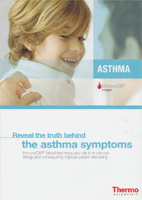
Asthma is a condition in which there is tightening, swelling, and increased mucus secretion of the airways in the lungs. This causes difficulty breathing, wheezing and tightening of the chest. It is most common in children and can be a mild or a life-threatening reaction. This condition can be caused by inhaling allergens such as pollen, pet dander, and dust; however, not all asthma is related to allergies. It can also be triggered by irritants such as tobacco smoke.
Asthma affects only those people with bronchial hyperre-activity, i.e. their bronchi are over-sensitive. This hyperreactivity (genetic in origin) may lead to asthma under the effect of certain factors classified as either non-specific or specific.
Non specific factors
Non-specific factors irritate the bronchi of people with hyperreactivity, thus provoking an attack. This is not a case of allergic asthma because no allergen is involved.
The commonest non-specific factors that can be breathed in include chalk-dust, fibreglass, cigarette smoke, irritant gases (e.g. hair sprays). Attacks can also be triggered by such things as cold, fog, stress, and even strong emotions.
Specific factors
True allergic asthma results from bronchial hyperreactivity plus allergic hypersensitivity. These specific factors may be grains of pollen, animal hair, household dust, mildew, foods, insect venom, or any other allergen.
Certain people are allergic without having bronchial hyperreactivity. When they come in contact with an allergen, they will not develop asthma, but rather rhinitis, conjunctivitis (eye complaints), or urticaria (hives).
Symptoms of asthma:
Asthma has a variety of symptoms, the most important being dyspnoea (hampered breathing, especially breathing out). Related symptoms include wheezing, tight chest, night-time dyspnoea, dyspnoea when making a physical effort, persistent coughing, etc.
When an attack happens, the asthmatic’s bronchi become obstructed due to:
- spasm : involuntary contraction of the smooth muscles lining the bronchi
- oedema : swelling of the bronchi caused by accumulation of liquid in the bronchial mucous membrane
- excessive mucus production: accumulation of a thick, viscous liquid in the bronchial glands
These three factors narrow the bronchi, making it difficult for air to pass through.
Is asthma “psychosomatic”?
A strong emotion, anger, a laughing fit: all can trigger an attack of asthma. But this does not mean that asthma can be dismissed as “nervous” or ” p s y c h o l o g i c a l ” ! The psychological factor in asthma cannot be ruled out (but this is true for all medical complaints). It should be remembered that emo-tions
can lead to intake of excess oxygen, causing hyperventilation. This “respiratory effort” of emotions could be sufficient to trigger an asthma attack.
Tip
Practising a sport is strongly recommended!
Sport not only helps the asthma sufferer to control the disease, it promotes better breathing.
But which sport should I choose?
Swimming in an indoor pool is an ideal choice, because the air is warm and moist. Moreover, swimming tones up the whole body and helps develop better breathing.
But be careful: some swimming pools contain too much chlorine, which could act as an irritant.
Always consult your doctor before deciding to practise any sport.

